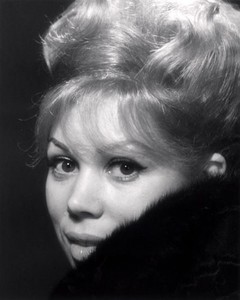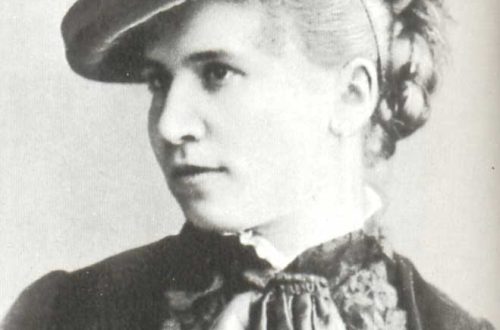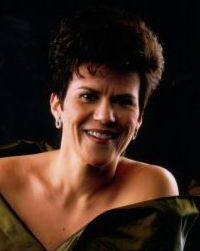
Miriam Gauci (Miriam Gauci) |
Miriam Gauci
Somewhere in the early 90s, while in Paris, on the last day before leaving, I wandered as if spellbound through a huge four-story music store. The record department was simply amazing. Having managed to spend almost all the money, I suddenly heard a conversation in German between one visitor and the seller. He, apparently, did not understand him well, but nevertheless, in the end, going up to one of the shelves with operas, he suddenly pulled out into the light of God some nondescript “double” without a box. “Manon Lescaut” – I managed to read the title. And then the seller began to show the buyer with gestures that the record is magnificent (this kind of facial expression does not need to be translated). He looked doubtfully at the discs, and did not take it. Seeing that the price was very suitable, and I just had a little money left, I decided to purchase a set, although the names of the performers practically did not tell me anything. I simply loved this opera by Puccini, until that moment I considered the exemplary recording of Sinopoli with Freni and Domingo. The version was completely new – 1992 – this increased curiosity.
Returning to Moscow, on the very first day I decided to listen to the recording. Time was short, I had to resort to the tried and tested old rule-test and immediately stage one of the favorite passages of the opera in the 2nd act: Tu amore? Tu? Sei tu (Duet Manon and Des Grieux), Ah! Manon? Mi tradisce (Des Grieux) and the amazing polyphonic fragment Lescaut that follows this episode! Tu?… Qui!… with the sudden appearance of Lescaut, trying to warn the lovers of the approach of Geronte with guards. When I started listening, I was just dumbfounded. I have never heard such a wonderful performance before. The flight and passion of the soloists, the parlando and rubato of the orchestra, led by the native of Iran Alexander Rabari, were simply amazing … Who are these Gauci-Manon and Kaludov-De Grieux?
The year of birth of Miriam Gauci was not easy to establish. A large six-volume dictionary of singers (Kutsch-Riemens) indicated the year 1963, according to some other sources it was 1958 (a considerable difference!). However, with singers, or rather with singers, such tricks happen. Apparently, Gauchi’s singing talent was inherited from her own aunt, who was a good opera singer. Miriam studied in Milan (including two years with D. Simionato). She participated and became a laureate of the Aureliano Pertile and Toti dal Monte vocal competitions. On the debut date, various sources also contradict each other. According to the latest information, already in 1984 she performed in Bologna in Poulenc’s mono-opera The Human Voice. According to the La Scala archive, in 1985, she sang here in the now forgotten (but once famous) opera Orpheus by the 17th century Italian composer Luigi Rossi (in the booklet for Manon Lescaut, this performance is marked as a debut). There is more clarity in the future career of the singer. Already in 1987, she had great success in Los Angeles, where she sang in “La Boheme” with Domingo. The singer’s talent manifested itself most clearly in Puccini’s parts. Mimi, Cio-Cio-san, Manon, Liu are her best roles. Later, she also showed herself in the Verdi repertoire (Violetta, Elizabeth in Don Carlos, Amelia in Simone Boccanegra, Desdemona). Since 1992, Gauci has regularly (almost annually) performed at the Vienna Staatsoper (the parts of Marguerite and Helena in Mephistopheles, Cio-Cio-san, Nedda, Elisabeth, etc.), always sensitive to new talents. Very fond of the singer in Germany. She is a frequent guest of the Bavarian Opera and, especially, the Hamburg Opera. It was in Hamburg that I finally managed to hear her live. This happened in 1997 at the play “Turandot” directed by Giancarlo del Monaco. The composition was promising. True, the reinforced concrete Gena Dimitrova, who was at the end of her career, seemed to me in the title role already a little … (how to put it delicately) tired. But Dennis O’Neill (Calaf) was in good shape. As for Gauchi (Liu), the singer appeared in all her glory. Soft lyricism in the performance was combined with the necessary amount of expression, fine focusing of the voice with intonation fullness (because it often happens that such a fragile natural instrument as the voice “falls” either into a “flat” vibrationless sound, or into excessive trembling).
Gauchi is now in full bloom. New York and Vienna, Zurich and Paris, San Francisco and Hamburg – such is the “geography” of her performances. I would like to mention one of her performances at the Bastille Opera in 1994. I was told about this performance of “Madama Butterfly” by one of my acquaintances who loved the opera, who attended a performance where he was greatly impressed by the duet of Miriam Gauci – Giacomo Aragal.
With this beautiful tenor, Gauci recorded La bohème and Tosca. By the way, it is impossible not to say a few words about the work of the singer in the field of recording. 10 years ago she found “her” conductor – A. Rabari. Almost all of Puccini’s major operas were recorded with him (Manon Lescaut, La bohème, Tosca, Madama Butterfly, Gianni Schicchi, Sister Angelica), Pagliacci by Leoncavallo, as well as a number of works by Verdi ( “Don Carlos”, “Simon Boccanegra”, “Othello”). True, the conductor, who feels better the “nerve” of Puccini’s style, succeeds less in the Verdi repertoire. This is reflected, unfortunately, in the overall impression of the performance.
Gauci’s art preserves the best classical traditions of operatic vocals. It is devoid of vanity, the brilliance of “tinsel” and is therefore attractive.
E. Tsodokov, 2001





